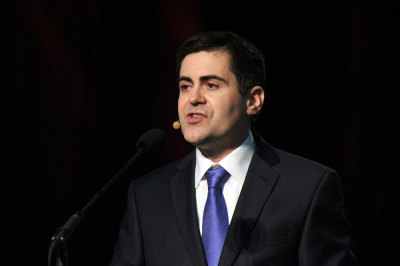'Often White Christians Assume That Normal Christianity Is White,' Southern Baptist Leader Russell Moore Says
Russell Moore, president of the ethics and public policy arm of the largest Protestant denomination in the U.S., shares his frustrations with how some Christians fail to pursue racial reconciliation and the particular challenge he faces as a white man in ministry in a video recently shared online.

"The easiest thing in the New Testament would have been to say, 'Let's plant Jewish Christian churches and Gentile Christian churches and let's just go in that direction and keep them from getting together and killing each other.' But that's not what the apostles did, because that's a sign to the powers and principalities," Moore says in a videotaped discussion posted online Friday by ministry website The Gospel Coalition.
Moore, president of the Ethics & Religious Liberty Commission of the more than 16 million-strong Southern Baptist Convention, went on to insist that racially and ethnically homogeneous black, white, Hispanic or other congregations should question why they do not have a diversity of ethnicities represented among their numbers.
Church leaders should ask themselves, "Does this really represent the kingdom of God?" he said.
In addressing the lack of diversity among its numbers, Moore suggested that churches should first acknowledge that there is "a problem," and then consider if their congregations' racial and ethnic makeup is a reflection of the community in which they are located.
The ERLC president and author went on to tell of "a friend who was talking to a pastor in Alabama who was serving a white church in a predominantly African-American community and the pastor said, 'I just don't know why we can't get black people to come to our church.'
"And he's seated at a desk, behind him is a Confederate flag and a bust of Stonewall Jackson (the Civil War general who led southern forces during the U.S. Civil War)," Moore explained.
Moore then went on to tell of his particular struggles as a white Christian minister.
He said, "The big burden I have as a white man is that often white Christians assume, without even thinking about it, that normal Christianity is white and that we then minister to black people, Asian people and Hispanic people and they're the ones receiving ministry. No, no, no, no, no.
"If this is going to change, the way it's going to change is by white people being ministered to by those who are called in leadership recognizing that most of the Body of Christ in heaven and on Earth isn't white, isn't American, never spoken English. When we start to have that sort of awakening in our own hearts, I think that's where we're gonna start to see some change."
Moore's remarks were made during a discussion with Robert Smith Jr., professor of Christian Preaching at Beeson Divinity School, and Jason Cook, campus pastor at Iron City Church in Birmingham, Alabama. The men, representing three generations, held their dialogue on the theme of "what has and has not changed with race relations in America," according to TGC's description of the video. Watch the complete video discussion on Vimeo, or in the player below:
Since taking on leadership of the Southern Baptist Convention's ERLC in 2013, Moore has become a go-to voice among Evangelicals and the secular press for representation of conservative Christian views on issues related to life, marriage and culture. The married father of five and ordained SBC preacher has been particularly vocal about racial justice and reconciliation since protests in Ferguson, Missouri, and New York set of national conversations about race. He also led discussions on "The Gospel and Racial Reconciliation" during the ERLC's Leadership Summit in March.
Moore's particular denomination, the SBC, was formed in 1845 when southern supporters broke away from northern partners over the former's decision to affirm slave owners as Christian missionaries. The denomination issued a "Resolution On Racial Reconciliation On The 150th Anniversary Of The Southern Baptist Convention" just 20 years ago, condemning slavery as an "evil practice." In the same resolution, the SBC "apologize(d) to all African-Americans for condoning and/or perpetuating individual and systemic racism in our lifetime." Today, the SBC represents a sizable African-American membership, though its influence among black women has been waning, according to Pew Research Center survey.





















